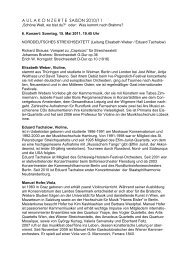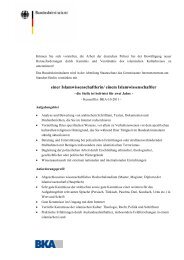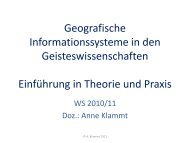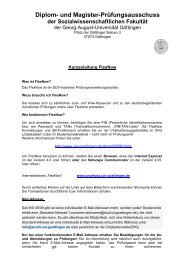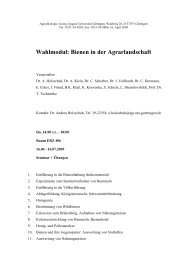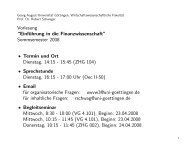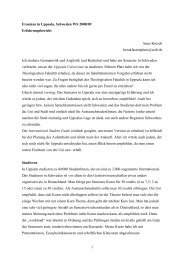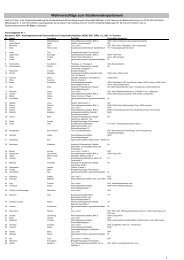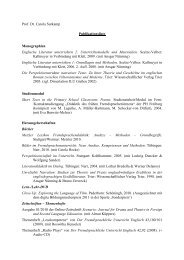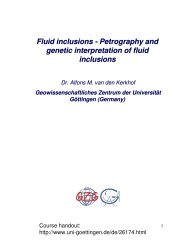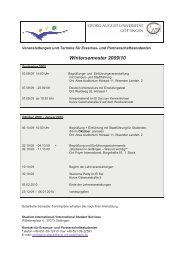The OMC inclusion and national social NGOs: From enthusiasm to ...
The OMC inclusion and national social NGOs: From enthusiasm to ...
The OMC inclusion and national social NGOs: From enthusiasm to ...
You also want an ePaper? Increase the reach of your titles
YUMPU automatically turns print PDFs into web optimized ePapers that Google loves.
policy development <strong>and</strong> implementation. Third, <strong>and</strong> more related <strong>to</strong> this <strong>OMC</strong> (as well as <strong>to</strong>the other <strong>social</strong> <strong>OMC</strong>s) is their very low degree of public visibility, or, as a French ac<strong>to</strong>r putit, their existence cl<strong>and</strong>estine, making it difficult <strong>to</strong> discover traces of the process - other thanthe official documents, but even these are not always made public – as well as <strong>to</strong> control forwhat one hears or reads. Which leads <strong>to</strong> fourth, a more general difficulty, but particularlypresent in such a sensitive policy area, that the interviewees are all ac<strong>to</strong>rs with institutional<strong>and</strong> / or political <strong>and</strong> normative interests <strong>to</strong> be defended against various other ac<strong>to</strong>rs, makingit even harder <strong>to</strong> come <strong>to</strong> a balanced conclusion. If an ac<strong>to</strong>r mentions the <strong>OMC</strong> as anargument that change occurred, this can be strategically motivated <strong>and</strong> must not necessarilybe true just as the absence of reference must not mean that the <strong>OMC</strong> had no consequences(Büchs 2004).<strong>The</strong>se – <strong>and</strong> other – considerations have been broadly absent or ignored in the conceptual <strong>and</strong>descriptive <strong>OMC</strong> literature which has tended <strong>to</strong> see the <strong>OMC</strong> as a <strong>to</strong>ol for supra<strong>national</strong>learning, mostly concluding that it can promote learning processes <strong>and</strong> eventually, that it hasalready promoted them. I have attempted <strong>to</strong> show that this scholarly majority is mislead withthe learning assumption, or more precisely, in connecting the <strong>OMC</strong> <strong>inclusion</strong> <strong>to</strong> (significant<strong>and</strong> organizational) learning processes, in the way of which st<strong>and</strong> institutional, organisational,political <strong>and</strong> normative differences as well as the organisation of the <strong>OMC</strong> itself (Kröger2006a; Kröger 2006b forthcoming). Interviewees have repeatedly stated that they thought thatlearning processes were taking place in the EU, not through this <strong>OMC</strong>, however. Instead, itmakes more sense <strong>to</strong> evaluate the <strong>OMC</strong> in the well-known categories of effectiveness <strong>and</strong>legitimacy (Offe 1998; Scharpf 1999). Due <strong>to</strong> the non-binding character, effectiveness,however, needs <strong>to</strong> be defined <strong>and</strong> evaluated in different ways (than looking at policyperformances <strong>and</strong> programmes as these cannot be clearly tracked back <strong>to</strong> the <strong>OMC</strong>). Withinmy PhD research, I am differentiating between internal effectiveness <strong>and</strong> externaleffectiveness, the prior relating <strong>to</strong> the domestic, the latter <strong>to</strong> the EU level (Kröger 2005). Bothlevels are analysed in terms of institutional capability building, a necessary predecessor ofpolicy development, <strong>and</strong> therewith effectiveness (Sacchi 2004). Institutional capabilitybuilding happens if resources are increased, if knowledge <strong>and</strong> awareness are increased <strong>and</strong>eventually lead <strong>to</strong> learning processes, if interministerial coordination is increased, if timelydata (indica<strong>to</strong>rs) exists <strong>and</strong> is made available, if one succeeds at placing the process at a highlevel of the involved institutions – a precondition of which is that the process is politicallyaccepted. Summarizing, the <strong>OMC</strong> <strong>inclusion</strong> could said <strong>to</strong> have been effective if it contributed



